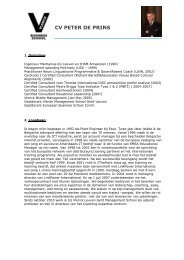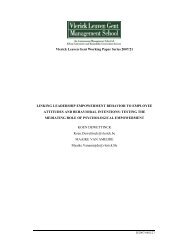Vlerick Leuven Gent Working Paper Series 2007/03 ... - Vlerick Public
Vlerick Leuven Gent Working Paper Series 2007/03 ... - Vlerick Public
Vlerick Leuven Gent Working Paper Series 2007/03 ... - Vlerick Public
Create successful ePaper yourself
Turn your PDF publications into a flip-book with our unique Google optimized e-Paper software.
In contrast, the contribution of executives sitting on the board is believed to be less<br />
straightforward. Although executive directors may bring along firm-specific information,<br />
which is presumed to lead to a more effective decision-making process (Fama and Jensen,<br />
1983; Rosenstein and Wyatt, 1990), their willingness to be actively involved in candid<br />
discussions has been questioned. It is argued that executive directors’ objectivity will be<br />
impaired by their dual role as full-time manager (Kosnik, 1987). Especially their ties and<br />
loyalty to the CEO, in addition to the fear of retaliation which could harm future working<br />
relationships or career perspectives, may prevent executive directors to openly voice<br />
disagreement during board discussions (Baysinger and Hoskisson, 1990; Patton and Baker,<br />
1987).<br />
At the same time, increasing board independence, by attracting more independent<br />
directors may hamper the integration of board members. By definition, independent directors<br />
are not employees of the company and do not assume management tasks. As most boards of<br />
directors meet only a few times a year, outside independent directors interact less frequently<br />
with each other and with the executives. Moreover, they are less close-knit because they have<br />
affiliations with different firms. Thus, we offer the following propositions :<br />
Proposition 2 a : an increase in board independence will increase debate<br />
Proposition 2 b : an increase in board independence is negatively related to<br />
cohesiveness<br />
Board diversity refers to the degree to which a board is heterogeneous with respect to<br />
informational demographic attributes (Jehn et.al., 1997). In particular, board diversity reflects<br />
differences in knowledge, experience and skills (due to educational, functional or<br />
occupational backgrounds, industry experience etc.). In the case of boards of directors, the<br />
issue of diversity is introduced by the resource dependence perspective. By recruiting outside<br />
directors with different backgrounds or who represent specific organizations, boards of<br />
directors help to link the company to its external environment and as such secure critical<br />
resources (Pfeffer, 1972). In addition, the interest in board diversity is growing, by no means<br />
under the pressure of major institutional investors (see for example, TIAA-CREF’s policy<br />
statement dating from 1997) and other shareholder activists. Directors themselves also<br />
stressed the importance of having a diversified mix of people on the board of directors in<br />
order to be effective (Levrau and Van den Berghe <strong>2007</strong>).<br />
18










